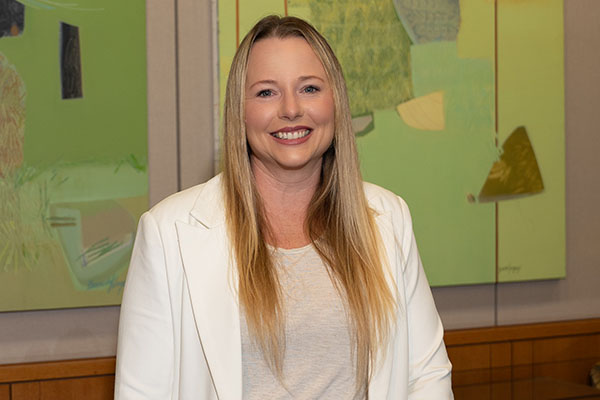Posted on October 15, 2025 by Wendy Frost

Somer Baburek
Founded in 2019, Hera Biotech is focused on commercializing diagnostic technology for women. They entered the space with a non-surgical, tissue-based test capable of diagnosing and staging endometriosis, a disease that affects more than 190 million women worldwide. More recently, they acquired a point-of-care cervical cancer device that will launch in Latin America this year.
Baburek’s passion for women’s health emerged while she was a student studying at UT San Antonio. “When I heard about the entrepreneurship program, how could I not want to do that?” she said. “The degree is applicable to any area of business. Dr. Anita Leffel was amazing and instilled this passion for entrepreneurship in her students.”
As part of one of Leffel’s classes, Baburek participated in a student technology venture competition. As a business student, her role was to develop a business and marketing plan for a product developed by an engineering student. But, Baburek saw a flaw in that process.
“I didn’t want to do any of the projects that were presented,” said Baburek, who was a nontraditional student. “I had an idea for a product, so I petitioned to do it on my own. The caveat was that I needed a prototype developed prior to the pitch. I hung out in the engineering building and found some students who were willing to help me put it together.”
Based on her experiences from the delivery of her first daughter, she created a labor and delivery monitoring device that was more user friendly. Baburek and her team won the competition, and it resulted in the creation of her first company, Claresta Solutions.
“It was a memorable experience that was a lot of fun. At the time I thought I’d found a blocking patent, so I didn’t pursue it further, but knowing what I know now, that wasn’t true. I still have that product in my back pocket and at some point in the future, I may revisit that idea,” she said.
Upon graduation Baburek used the connections that she developed through the competition and worked for 10 years at Targeted Technology Fund, a life sciences focused venture investment firm in San Antonio.
“I worked on diligence for companies seeking funding and served as the director of clinical operations for a couple of companies, sat on boards and filled in gaps. I got to wear a lot of hats and learn a lot of things,” said Baburek, who grew up in the Rio Grande Valley.
When those companies were exited, Baburek reflected on next steps in her career. With not many opportunities in San Antonio, she wasn’t sure what that meant for her and her family.
“I was struggling with what to do next, and my husband came up to me and said ‘if only you knew how to start a company, raise money, write a business plan and commercialize technology.’ And I thought, oh yeah, I do know how to do that. That is what led me down the venture fund pathway,” she said.
Circling back to her start in women’s health, she realized that not once while looking for deals in her previous role did she see any opportunity in that area.
“There are huge gaps in new ventures being established for women’s healthcare,” said Baburek, who also earned an MBA in data analytics from LSU. “And I thought, why is that? So, I decided that if no one else is willing to roll up their sleeves and fill these gaps, I needed to step up to take on this challenge.”
Based on her knowledge of the industry, she chose to focus on the diagnostic market. Baburek picked endometriosis because it was the largest unmet healthcare need for women outside of oncology. While searching for the right technology to pursue, Baburek landed on a product developed at UT San Antonio Health Science Center and received funding from her former boss to help get it off the ground.
Surrounded by a team of medical professionals, most of Baburek’s day involves talking to investors, revising their strategic plan and making pitches. Recently she acquired a competing technology from a competitor and began working together with that researcher.
“Women’s health is tragically underfunded,” said Baburek. “So unfortunately, that means a lot of companies in this space are chronically undercapitalized. Our team is small, but relatively mighty.”
One of her proudest moments as a wife and mother of three daughters is hearing them brag about her accomplishments. Baburek also shares that the best part of her job is seeing how her work can impact actual patient care.
“What I love about entrepreneurship is that it is extremely varied,” she said. “I have to be quick on my feet. My education from UTSA gave me the basics for creating a business plan, understanding financial projections and reading accounting statements. My time in the industry helped me understand what investors are looking for.”
Baburek’s long-term plan for Hera Biotech is to build the company as though they were going to issue an Initial Public Offering (IPO). Knowing that they will need to continue innovating, she plans to continue looking for products to develop and keep pushing and grinding.
For those with entrepreneurial aspirations, Baburek notes that the best advice is to just do it. “There’s never a right time. You’re never going to be prepared. But what I will tell you is that even if it is a complete and total failure, you will learn an immense amount from that, and maybe it will be the thing that you take into the next venture that makes you successful. You will never regret betting on yourself.”

